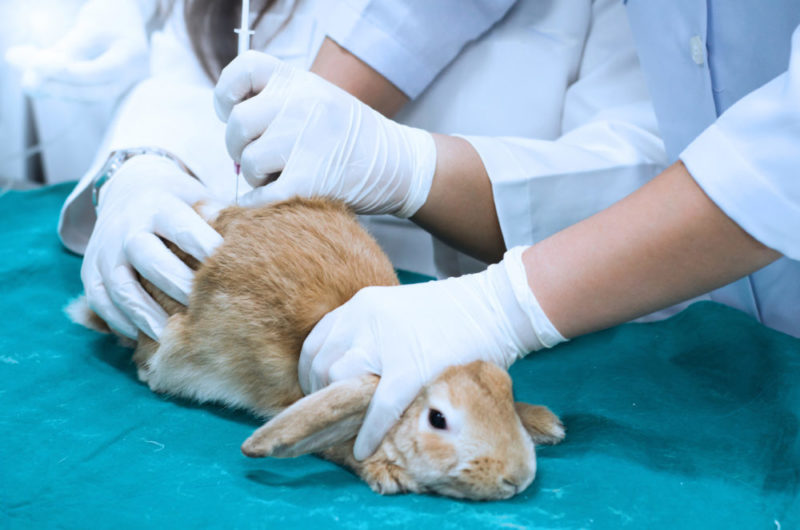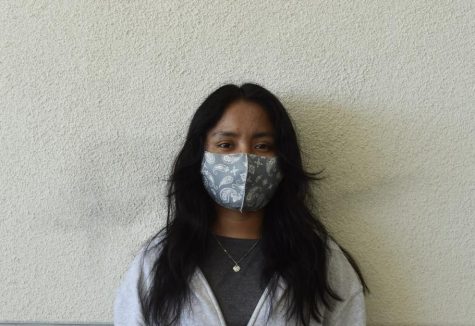Scientists testing an injection on a rabbit. Courtesy of InVitro International
Opinion: What it means to ignore Animal Testing
Why animal testing is a bigger issue than people think
September 10, 2021
When we enter stores, we see millions of products. Perfumes that give us a scent of heaven, skin products that make our skin glow, with hair products that make our hair clean and fresh. As well as makeup products, that come with a variety of colors to pick from. But have we ever bothered to think how these products were made?
The idea of animal cruelty has been around back to the writings of the Ancient Greeks in the 4th and 3rd century BCE, so we can conclude that animal testing has been around for a while. But how has today’s society view changed? Animal testing was a form of safety, to obtain information to a certain drug or cosmetic to make sure that is effective. The attitude of society in the nineteenth century transformed. During the last half of the nineteenth century, people began to adopt anti-cruelty laws which we still use today. However, there is still a debate whether it is okay or not.
I disagree with those in favor of supporting animal testing, since the value of animal lives are worth more than property and they should not be kept in cages. They are part of our world to show the beauty of it. Although there are many types of animal testing, regulatory testing is mostly used for medicines, paints, ink, food additives, and cosmetics. The products we see in stores can be a reflection of the horror and fear animals have to endure. The methods these researchers use are not gentle and safe, they are quite immoral and cruel.
According to Cruelty Free International, the process of this type of testing includes animals being forced to inhale or eat the substance being tested or have it rubbed onto their skin or injected into their bodies. If this isn’t dreadful enough, the Cruelty Free International shares what animals are then forced to undergo while being monitored and tested. Before being killed, researchers look at the effects of drugs, cosmetics, etc. on their organs. This is inhumane as these experiments are extreme, since most of them repeat surgeries on them, implant wires in their brains, crush their spines and many other horrible things.
However, Marc Bekoff, an evolutionary biologist, argues that mammals share the same nervous system, perception, and emotions, just like we do. Knowing that there might be a chance that mammals experience and handle pain as we do, shows a lot about humans’ wicked nature.
According to Britannica ProCon, the USDA (United States Department of Agriculture) breaks down three groups of pain types: animals that experience pain but are given drugs (339,769 animals in 2010); animals that experience pain but are not given drugs (97, 123); animals that do not experience pain and are not given drugs (697,801).
Animals being put in cages and machines shows us the devastating, dark side of animal testing. More than 155 million animals are used worldwide in experimentation. Animals that are placed in places with little light and with no windows for the rest of their life can affect these mammals drastically.
Cambridge University Press further explains, “Captivity and the common features of biomedical laboratories—such as artificial lighting, human-produced noises, and restricted housing environments—can prevent species-typical behaviors, causing distress and abnormal behaviors among animals.”
Animal testing needs to stop as it does not benefit the animals or humans. Additionally, animal testing is not always reliable. The National Institutes of Health has confirmed that 95 percent of all drugs that are shown to be safe on animals. It’s not shown to be safe in human trials. The rest of the drugs that are shown to be safe, end up having side effects that were not shown during tests on animals.
Besides, according to PETA (People for the Ethical Treatment of Animals), more than 100 million animals die in the U.S. every year in cruel chemical, food, and cosmetics tests. Lord Eskine, a British lawyer and politician in the late 1800’s, addressed the importance for the protection of animals. He argues, “They are created, indeed, for our use, but not for our abuse. Their freedom and enjoyment, when they cease to be consistent with our dominions… whilst they are consistent I say their rights, subservient as they are, ought to be sacred as our own.”
The words of Eskine, clearly point out that animals clearly obey us without questioning our motives. But using this as an advantage to abuse them, should not be tolerated. Hence, why we should not be ignorant about animal testing.



Ailany Perez Cruz • Sep 22, 2021 at 7:33 pm
So beautifully written, I’m so proud of you Anita ?